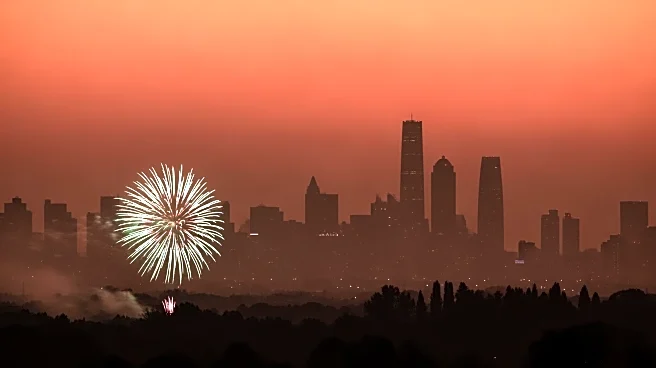What's Happening?
Delhi, India's capital, experienced a significant decline in air quality following the Hindu festival of Diwali, despite a court directive to use less-polluting 'green' fireworks. The Air Quality Index (AQI) in Delhi reached 360, indicating 'very poor'
conditions, with PM 2.5 levels far exceeding World Health Organization guidelines. The city's pollution is exacerbated by factors such as vehicular emissions, dust, and crop stubble burning in neighboring states. Although the Supreme Court had relaxed a previous ban to allow green crackers, which are said to emit 20-30% less pollutants, enforcement was lax, and traditional fireworks were still widely used. This led to a thick smog enveloping the city, reducing visibility and making breathing difficult for residents.
Why It's Important?
The deterioration of air quality in Delhi highlights ongoing challenges in managing pollution in one of the world's most polluted cities. The failure to enforce the use of green fireworks underscores the difficulty in balancing cultural traditions with environmental health. The situation poses significant health risks to the population, particularly vulnerable groups such as children and the elderly, who are more susceptible to respiratory issues. The event also raises questions about the effectiveness of legal measures and public awareness campaigns aimed at reducing pollution. The broader implications include potential impacts on public health systems and economic productivity due to increased health-related absences and medical costs.
What's Next?
In response to the worsening air quality, officials have invoked the next stage of the Graded Response Action Plan (GRAP), which includes restrictions on diesel generators and the burning of coal and firewood. However, the effectiveness of these measures remains to be seen, as similar efforts in the past have had limited success. The government may face increased pressure to implement more stringent regulations and improve enforcement mechanisms. Additionally, there may be calls for greater public education on the health impacts of air pollution and the importance of adhering to environmental guidelines.
Beyond the Headlines
The situation in Delhi reflects a broader global challenge of balancing cultural practices with environmental sustainability. The use of fireworks during festivals is a deeply ingrained tradition in many cultures, yet it poses significant environmental and health risks. This case highlights the need for innovative solutions that respect cultural practices while minimizing environmental impact. It also underscores the importance of international cooperation in addressing transboundary pollution issues, as air quality in one region can be affected by activities in neighboring areas.

















